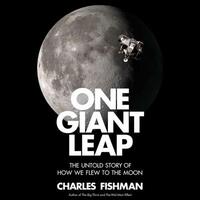Take a photo of a barcode or cover
There was so much I didn't know about the Apollo program, despite my enthusiasm for NASA and space exploration.
hopeful
informative
inspiring
medium-paced
Interesting from the perspective of understanding just how far away from landing on the moon we were when Kennedy made his famous challenge
Very thorough look at how we got to the moon, why we went to the moon, and how it changed the world. So many statistics, numbers, and dates. Lots of historical and political context you often don’t get in museum exhibits about the moon landings.
Overall, very well researched, educational book.
Overall, very well researched, educational book.
It was a good and informative book, but was about 200 pages too long
informative
inspiring
fast-paced
One Giant Leap felt like a very different history of the Apollo Program that landed the first, and to date only, humans on our moon. Charles Fishman takes a more more analytical approach, as opposed to the celebretory narratives that define the genre. Despite the sub-title's hyperbole of calling it an "impossible mission" Fishman really never succumbs to the romance. That's not to say he does not spend considerable time telling the reader exactly how remarkable a feat the moon landings were, how remarkable the effort was on the part of so many people, it's that he somehow does it while still applying a healthy dose of journalistic skepticism to his commentary. The first time the casual space enthusiast gets a sense that this history is going to be different is when we get a lengthy, exhaustive, and well-explained, chapter about the Apollo computers. Fishman's statement that the single greatest leap forward in tech spurred by the moon mission was in the creation of the relatively tiny computers needed to navigate to and from the moon. At the time the Apollo spacecraft were being designed and built computers were room-sized at best, and tediously slow to program and utilize. Apollo needed computers that would work in real-time and fit both space and weight-wise, in a space far less than any computer that existed. Fishman's explanation of that technological development, how it happened, what it looked like, and what it meant not just for the space program, but for the future of computing, set a high bar for the rest of the story. In many ways, Fishman tells us, the leaps for Apollo to get to the moon were more about national will, and organizational mangement. The actual tech used was largely engineered using what we already knew, or could learn and fashion, all in the limited time available due to the desire to meet the artificial deadline created by President John F. Kennedy in 1961, and then given greater urgency with his assassination in 1963. It is possible, maybe even likely, that we would not have made it to the moon by the end of 1969 had Kennedy lived. The timeline that existed up to that point had a moon landing happening AFTER Kennedy would have been done with his second term. The idea that the urgency would have even remained in an already skeptical Kennedy (Fishman points that in private Kennedy was not as enthused as his public statement suggested) during a second term in which he would be handing the accomplishment off to a successor is not far fetched. Kennedy used the successes of the Soviet Union during the Eisenhower admin as a campaign wedge, and then showed less than fervent interest in space once he was in office. It was the work of many in NASA and surrounding scientific groups that carried the torch with greater energy. Fishman does an admirable job of bringing out the works of the MIT scientists behind the computers, and scientists, engineers and adminstrators at NASA, in making the moon landings a reality. Doc Draper at MIT, Bill Tindall at NASA, two names I have not likely ever known before, come across very much as heroes in their own ways. So many histories of the space program focus almost exclusively on the astronauts. And, yes, justifiably so as they were the ones who's lives were on the line. But there is little doubt that so many of those working to make the moon landing a reality felt an urgency not dissimilar to that of the astronauts. I was born before the moon landing, but I fall into the demographic of the 70% of the populace (as of the writing of this book in 2018) who were not born, or were under the age of five, when humans walked on the moon. Yet space, the moon landings, even the space shuttle and ISS have fascinated me all my life. To this day I wish we could again harness the sense of awe and inspiration that Apollo did. Of course Fishman applies his skepticism liberally, but also fairly, and spends an entire chapter asking the questions that came up at the time, and persist, about the value of the mission, the success, the contributions Apollo has had (or not had) on our society and world in the years since. He inserts these questions throughout the text and then in that final chapter really dives deep. In the end, after pointing out how much more the war in Vietnam cost than the entire space program, and balancing that expense with intangible benefits, I think he comes down in the side of Apollo having been a net good.
Read for PopSugar's Reading Challenge #1: Read a book with "leap" in the title.
Fascinating and easy to read.
Fascinating and easy to read.
To naprawdę porządny reportaż. Przede wszystkim uświadomił mnie, że wyprawa na Księżyc to dużo więcej polityki i przełomów niż mi się wydawało.
informative
slow-paced
informative
reflective
slow-paced


